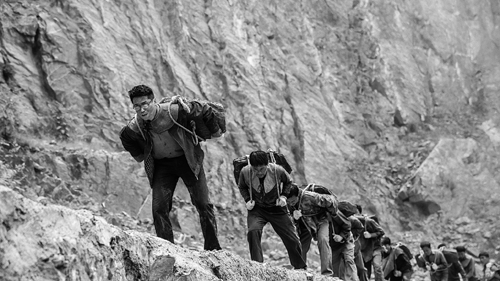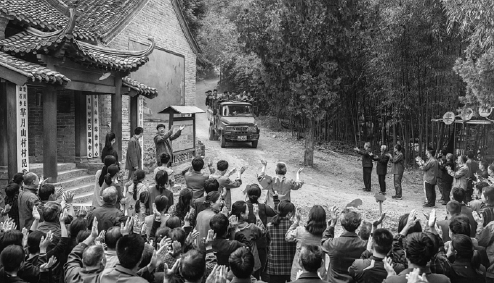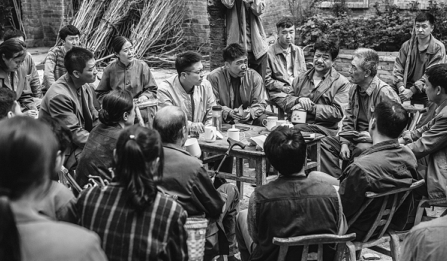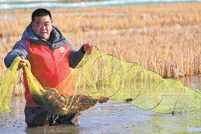Moving mountains
Touching TV drama illustrates the struggles and successes of a young Party cadre fighting for rural revitalization, Wang Ru reports.

When director Gao Xixi met Wang Tao in Miyueshan village, Xichuan county, Henan province, for the first time at the beginning of 2020, he was surprised to find the Party secretary, assigned to the village by the Research Office of the State Council, quite different from how he'd imagined him. Wang is an inspiration for Bai Lang, hero of the TV series Flowered Mountain Village, which Gao, at the time, had yet to direct.
"Having graduated from Peking University, the village Party secretary seemed to be gentle and cultured. He wore a pair of glasses just like a student. I thought, 'He doesn't seem strong enough, how can he work in the village?'"
But when Wang took him on a tour around the village, talking about the changes there, Gao gradually started to see the strengths of the young secretary, who had really made a difference in the area in just two years and was welcomed by local people wherever he went.
The TV series Flowered Mountain Village, which stars actor Wang Lei and actress Li Xiaomeng, started airing on CCTV-1 on Aug 29. Adapted from a novel written by Hu Peiyuan, who works at the Counselors' Office of the State Council, the 34-episode production describes young Party cadre Bai's experience working as a Party secretary trying to help revitalize the mountainous Miyueshan village while protecting the environment.
"I believe the biggest advantage of this production is that it reflects reality," says Gao. "Most of the stories are adapted from real life experiences, and we followed the principle that, while big events must be portrayed accurately, we could take artistic liberties with small details."
The characters are based on real-life people, and the team added details to their stories so that "the audience will feel they are as real as someone living by their side", according to Gao.
In the drama, some villagers form a team engaged in projects to make money for the village. After receiving a lucrative order for stones from a construction company, secretary Bai leads the villagers in working solidly for a month on the mountain to finish the task and to live in a temporary grass shed near the work site. When they return to the village, they are welcomed by other villagers, even though they are hardly recognizable with their deeply tanned skin.
"This story arc was adapted from the real story of Wang Tao. Actors didn't need to say many lines since their actions were moving enough. You couldn't fabricate such a vivid story," says Gao.
Cast and crew started filming in Cangfang town, Xichuan county, Henan province, in March last year, and finished in June. Due to the COVID-19 pandemic, all cast members stayed on location during the whole process.
"Despite the difficulties caused by the pandemic, it made us more focused on creation. Besides filming, we were reading the script and considering how to film the next scene. Not far from where we settled was an ancient temple. Every day when we heard the sound of a bell in the temple, it gave all peace of mind," says Gao.
Author Hu was pleased with the treatment of his story. "I was very excited and moved to tears after watching clips of the drama, since it has a strong visual effect, and the cast's performances match what I described in the book," he says.
According to Hu, when he wrote the book, he focused on not only rural revitalization, but also Party cadre cultivation. "Our Party has sent many young cadres to work as grassroots officials, it helps cultivate them so that we will have qualified successors."
After playing the role of Bai, actor Wang Lei says, "I have gained a deeper understanding of a village Party secretary's work. I believe they are just like heroes of a peaceful era, since they also fight for, and even devote their lives to, their cause. Their lofty faith inspires me a lot."
Environmental protection is another focus of the drama. As a water source region of the middle route of the South-to-North Water Diversion Project, Xichuan county provides water for more than 20 cities in North China, including Beijing, Tianjin and cities in Henan and Hebei provinces, and boasts a good natural environment.
"As we show in the drama, the battle between environmental protection and economic development has always been staged at the grassroots level. For example, in one story arc, rubbish is getting dumped in rose valley, a famous natural attraction in the village where many roses grow. The act leads to a deterioration in the environment and villagers falling sick as a result, Bai reports it to the necessary departments of the government and gets the dumping stopped," says Gao.
"I want to show a model of rural revitalization and protecting the environment is an important part of that," he adds. "I hope our work can draw people's attention to rural development, which may encourage them to contribute more to that development in future."



Today's Top News
- China-Cambodia-Thailand foreign ministers' meeting held, press communique issued
- Drills demonstrate China's resolve to defend sovereignty against external interference
- Trump says 'a lot closer' to Ukraine peace deal following talks with Zelensky
- China pilots L3 vehicles on roads
- PLA conducts 'Justice Mission 2025' drills around Taiwan
- Partnership becomes pressure for Europe






























